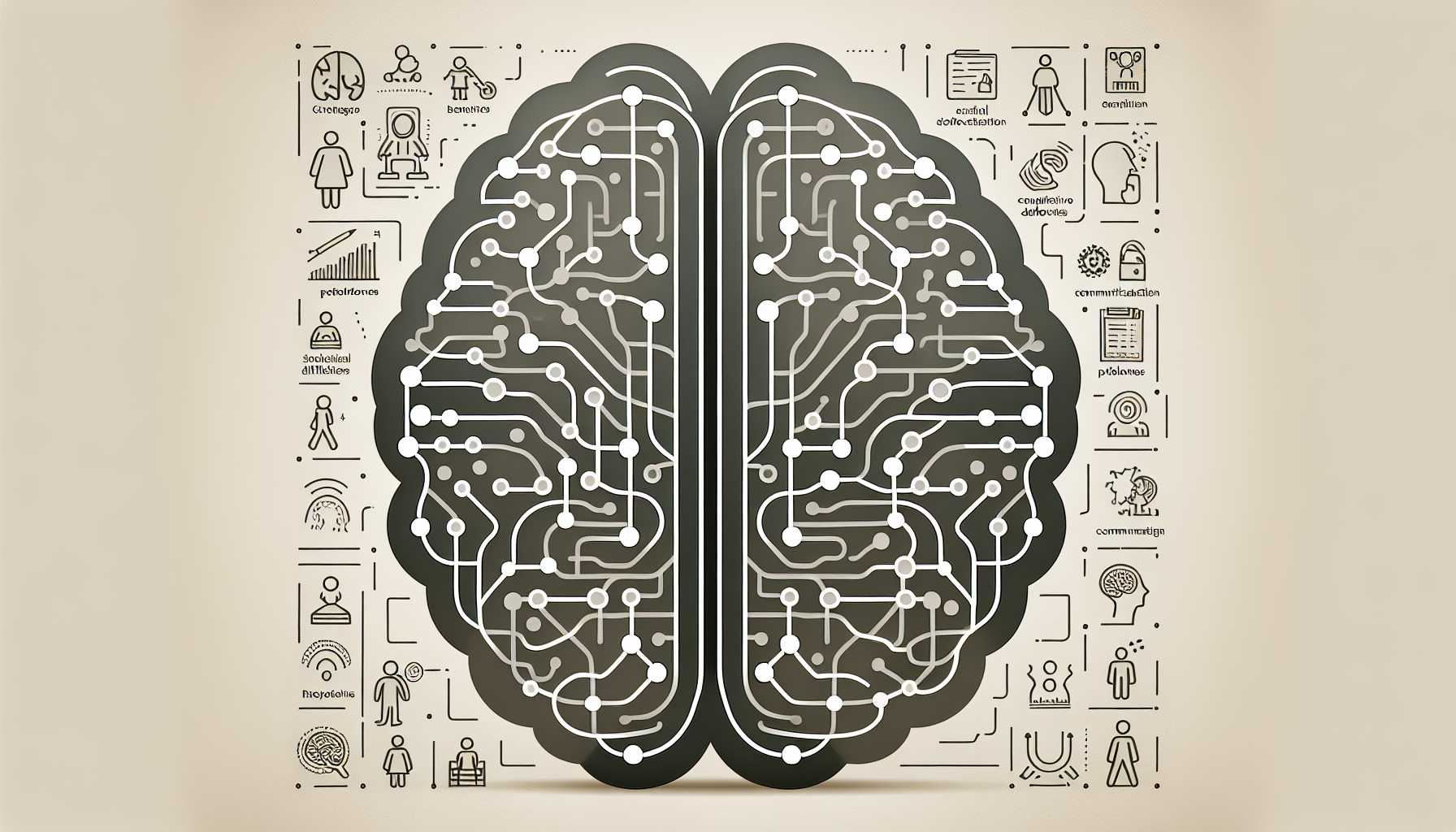Impact of Untreated Autism
Untreated autism can lead to various negative consequences that affect an individual’s mental health and quality of life. Understanding these effects is crucial to raising awareness about the importance of early diagnosis and treatment.

Mental Health Conditions in Autistic Individuals
It’s essential to note that untreated autism often coexists with mental health conditions. Seven out of ten autistic people have a mental health condition such as anxiety, depression, attention deficit hyperactivity disorder (ADHD), or obsessive-compulsive disorder (OCD).
Research suggests that standard behavioral approaches are not adequately addressing mental health issues in individuals with autism spectrum disorder (ASD). There are high rates of comorbidity between ASD and other psychological disorders, including depression and anxiety. This indicates the need for a shift in the way clinical practitioners approach work with this population to include trauma-focused assessment strategies and clinical interventions [2].
Preliminary findings indicate that individuals with ASD may be at high risk for experiencing stressful and traumatic life events which can negatively impact mental health through the development of comorbid psychopathology and/or worsening of core ASD symptoms.
Traumatic and stressful life events are known risk factors for several mental health disorders, including depression and anxiety, in individuals with ASD [2].
Long-Term Effects of Untreated Autism
As for the long-term effects, without adequate support, children with untreated autism may have trouble developing competent skills in learning, speech, or social interactions. Adults who have not received appropriate treatment may also struggle with living independently, unemployment, and relationships.
This highlights the importance of early intervention and continued support for individuals with autism, both in childhood and adulthood. By addressing autism early and providing comprehensive treatment, individuals with autism can lead fulfilling lives and reach their full potential. Future sections will discuss the importance of early intervention in more detail.
Sensory Sensitivities in Autism
People with autism often experience sensory sensitivities, which can affect their daily life. These sensitivities can manifest as oversensitivities or undersensitivities, with varying degrees and expressions.
Sensory Oversensitivities
Autistic individuals with sensory oversensitivities may find certain sensory inputs overwhelming. This can lead to displays of distress, such as crying, wanting to get away from the sensory input, or seeming restless, stressed, or irritable. Some might also put their hands over their ears or eyes, engage in more stimming activities, or withdraw entirely [4].
These oversensitivities may cause avoidance of sensory experiences that are unpleasant. For instance, an individual may show discomfort in rooms with bright lights or direct sunlight, or avoid certain textures or tastes in food [4].
Sensory Undersensitivities
Conversely, some autistic individuals may exhibit undersensitivities to sensory information. In these cases, they might seek out sensory experiences and enjoy stimuli that others might find overwhelming, such as bright colors, tight hugs, and strongly flavored foods like onions and olives.
This could lead to behaviors such as a constant need for movement, difficulty recognizing sensations like hunger, illness, or pain, or attraction to loud noises, bright lights, and vibrant colors, resulting in sensory seeking behavior.
Managing Sensory Issues
Managing sensory sensitivities in autistic individuals can be challenging, but it’s crucial for their comfort and wellbeing. Sensory sensitivities can impact the whole family, affecting daily activities and experiences such as school.
Various professionals can assist in managing these sensitivities. Occupational therapists can assess sensory needs, while dietitians, speech pathologists, optometrists, and audiologists can assist in managing sensory sensitivities related to taste, smell, sound, vision, and hearing, respectively.
Additionally, understanding and accommodating sensory issues can facilitate comfort, increase opportunities for learning, socializing, communicating, and community participation. This might be achieved through environmental modifications, tools, strategies, habits, or routines tailored to individual needs [5].
Ultimately, managing sensory sensitivities in autism is an ongoing process. With appropriate support and understanding, individuals with autism can lead fulfilling lives while navigating their unique sensory experiences.
Behavioral Challenges in Autism
Individuals with untreated autism often face numerous behavioral challenges. These may notably include communication difficulties, struggles with social interaction, and other challenging behaviors.
Communication Difficulties
One of the key markers of autism is difficulty with communication. This can manifest as delayed speech, lack of eye contact, and difficulty understanding social cues. Without proper intervention and treatment, these communication difficulties can persist, impacting the individual’s ability to succeed in life. Proper and timely intervention is vital in helping individuals with autism develop the necessary communication skills.
Social Interaction Struggles
Social interaction is another significant challenge for individuals with untreated autism. Difficulty in understanding and responding appropriately to social cues can make it hard for them to make friends and participate in social activities. Over time, this can lead to social isolation, which can further contribute to mental health conditions such as depression and anxiety. It underlines the importance of early intervention and treatment in autism, which can significantly improve social interaction skills and overall quality of life.
Challenging Behaviors
Autism can also result in challenging behaviors, such as repetitive movements or insistence on routines. These behaviors can interfere with daily life and make it difficult for individuals to function effectively in society. Without appropriate treatment, these behavioral issues can persist and may even worsen over time, highlighting the question of ‘what happens if autism is not treated?’ It’s crucial that behavioral issues associated with autism are addressed early and effectively to ensure the individual can lead a fulfilling life.
In conclusion, untreated autism can lead to significant behavioral challenges that can impact an individual’s communication abilities, social interaction skills, and overall behavior. Early intervention and treatment are instrumental in addressing these issues and improving the quality of life for individuals with autism.
Mental Health Risks in Untreated Autism
Understanding the implications of untreated autism is crucial in highlighting the significance of early intervention. Research has shown that untreated autism can lead to various mental health conditions that can significantly impact an individual’s quality of life.
Anxiety and Depression
Anxiety and depression are two common mental health conditions associated with untreated autism. Seven out of ten autistic people have a mental health condition such as anxiety, depression, attention deficit hyperactivity disorder (ADHD) or obsessive-compulsive disorder (OCD).
The social and communication difficulties that often accompany autism can result in feelings of isolation and anxiety, while behavioral issues can contribute to poor mental health outcomes. Traumatic and stressful life events, which individuals with ASD may be at high risk for experiencing, are known risk factors for several mental health disorders, including depression and anxiety.
Social Isolation
Individuals with untreated autism often struggle in social situations due to their communication and interaction difficulties. This can lead to feelings of social isolation, which can further exacerbate mental health conditions such as anxiety and depression.
A supportive social network, including family, friends, and the community, is vital in addressing these issues. Early intervention, therapy, and social skills training can help individuals with autism to develop their social skills and reduce feelings of isolation.
Behavioral Issues
Behavioral issues are another common concern in individuals with untreated autism. Approximately 46% of adults with autism exhibit behaviors such as being disruptive, engaging in self-harm, or being destructive.
The presence of behavioral issues can further strain the individual’s social interactions and contribute to their mental health challenges. Research suggests that standard behavioral approaches are not adequately addressing these issues in individuals with ASD, indicating the need for a shift in clinical practices to include trauma-focused assessment strategies and clinical interventions [2].
When asked, ‘what happens if autism is not treated?’, it’s clear to see the wide array of mental health risks associated with untreated autism. It’s therefore crucial to prioritize early diagnosis and intervention in order to mitigate these risks and improve the quality of life for individuals with autism.
Sensory Issues in Autism
Sensory issues are a common aspect of autism, often manifesting as hypersensitivity or hyposensitivity. These issues can significantly affect the daily lives of autistic individuals, impacting their ability to interact with their environment and others. Understanding these sensory challenges is critical when exploring the question, “What happens if autism is not treated?”
Hypersensitivity and Hyposensitivity
Autistic individuals may experience hypersensitivity to certain sensory stimuli, including bright lights, specific light wavelengths, sounds, smells, textures, and tastes. This heightened sensitivity can lead to sensory avoidance behaviors, such as pulling away from physical touch, covering the ears to block out loud sounds, or avoiding certain types of clothing.
On the other hand, hyposensitivity is also prevalent among people with autism. This under-sensitivity to sensory input can manifest as a constant need for movement, difficulty recognizing sensations like hunger, illness, or pain, or attraction to loud noises, bright lights, and vibrant colors. As a result, individuals with hyposensitivity may engage in sensory seeking behavior, actively seeking out intense sensory experiences.
Sensory Overload and Stimming
Sensory overload is a significant issue for many autistic individuals. Triggered by intense sensory stimuli, it can lead to overwhelming anxiety, a need to escape, and difficulties in communication. This sensory bombardment can affect various functions, including speech, decision making, and information processing.
Stimming, characterized by repetitive movements, sounds, or fidgeting, is a form of sensory seeking behavior common among autistic individuals. It is often a coping mechanism to regulate their sensory systems and manage uncomfortable sensory input. However, suppressing stimming in certain settings can lead to difficulties in self-regulation, sensory overload, exhaustion, or burnout [5].
Understanding and accommodating these sensory issues is crucial in supporting autistic individuals. By making environmental modifications, providing appropriate tools, and implementing strategies, habits, or routines tailored to individual needs, we can facilitate comfort and increase opportunities for learning, socializing, communicating, and community participation. These efforts are key in addressing the potential effects of untreated autism, highlighting the importance of early diagnosis and intervention.
Importance of Early Intervention
When it comes to managing autism, early intervention is a crucial component. It can significantly alter the course of a child’s development and quality of life by addressing autism symptoms, learning difficulties, and other challenges.
Benefits of Early Diagnosis
An early diagnosis of autism offers numerous benefits. Research indicates that early diagnosis and interventions for autism are more likely to have significant long-term positive effects on symptoms and later skills.
Early interventions are recommended at or before preschool age, starting as early as 2 or 3 years of age. During this time, a child’s brain is still highly plastic, increasing the chances of the treatments being effective in the long term. Early intervention services are recommended to start as soon as autism spectrum disorder (ASD) is diagnosed or seriously suspected, according to recent guidelines [7].
Early intervention provides children with autism the best start possible, increasing their chances of developing to their full potential. The sooner a child receives help, the greater the opportunity for learning and progress.
Early Intervention Programs
There are numerous early intervention programs designed to help children with autism acquire basic skills typically learned in the first 2 years of life. These programs can lead to significant progress, with some children no longer on the autism spectrum as they grow older.
State-run early intervention programs for children diagnosed with developmental delays or disabilities, including ASD, are available in each state. These programs are specified by Part C of Public Law 108-77 (The Individuals with Disabilities Education Improvement Act – 2004), also known as “IDEA” [7].
These programs work to address the various developmental, social, and behavioral challenges faced by children with autism. They offer a comprehensive, multidisciplinary approach that can include speech therapy, occupational therapy, physical therapy, social skills training, and behavioral interventions.
In conclusion, early intervention plays a crucial role in managing autism. While it does not guarantee that a child will no longer have autism as they grow up, it can significantly improve their quality of life by helping them develop skills and abilities that enable them to navigate the world more effectively.
References
[1]: https://www.mentalhealth.org.uk/explore-mental-health/a-z-topics/autism-and-mental-health
[2]: https://www.ncbi.nlm.nih.gov/pmc/articles/PMC6061115/
[3]: https://www.amenclinics.com/blog/what-happens-when-people-with-autism-go-untreated/
[4]: https://raisingchildren.net.au/autism/behaviour/understanding-behaviour/sensory-sensitivities-asd
[5]: https://www.autismspeaks.org/sensory-issues
[6]: https://www.bridgecareaba.com/blog/what-happens-if-autism-is-not-treated
[7]: https://www.nichd.nih.gov/health/topics/autism/conditioninfo/treatments/early-intervention

 We've just released an article!
Check out our blog!
We've just released an article!
Check out our blog!



